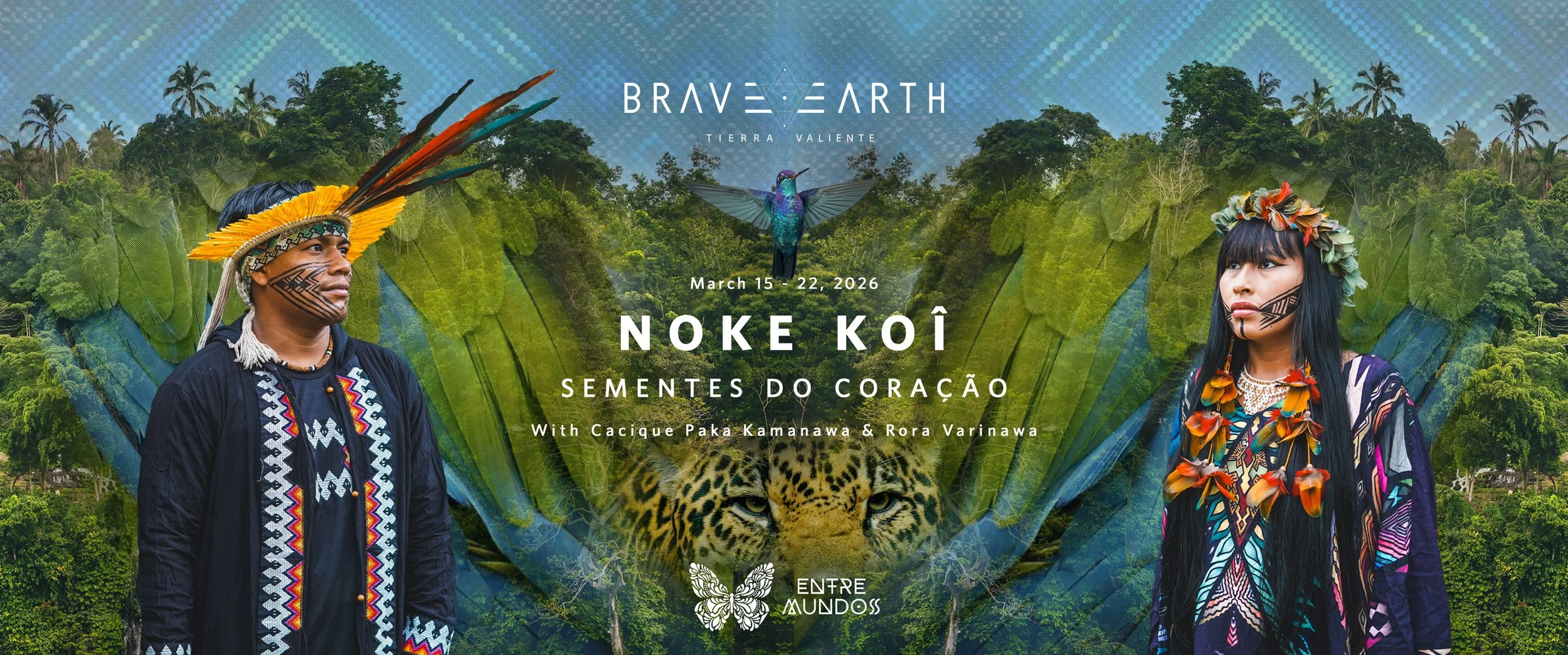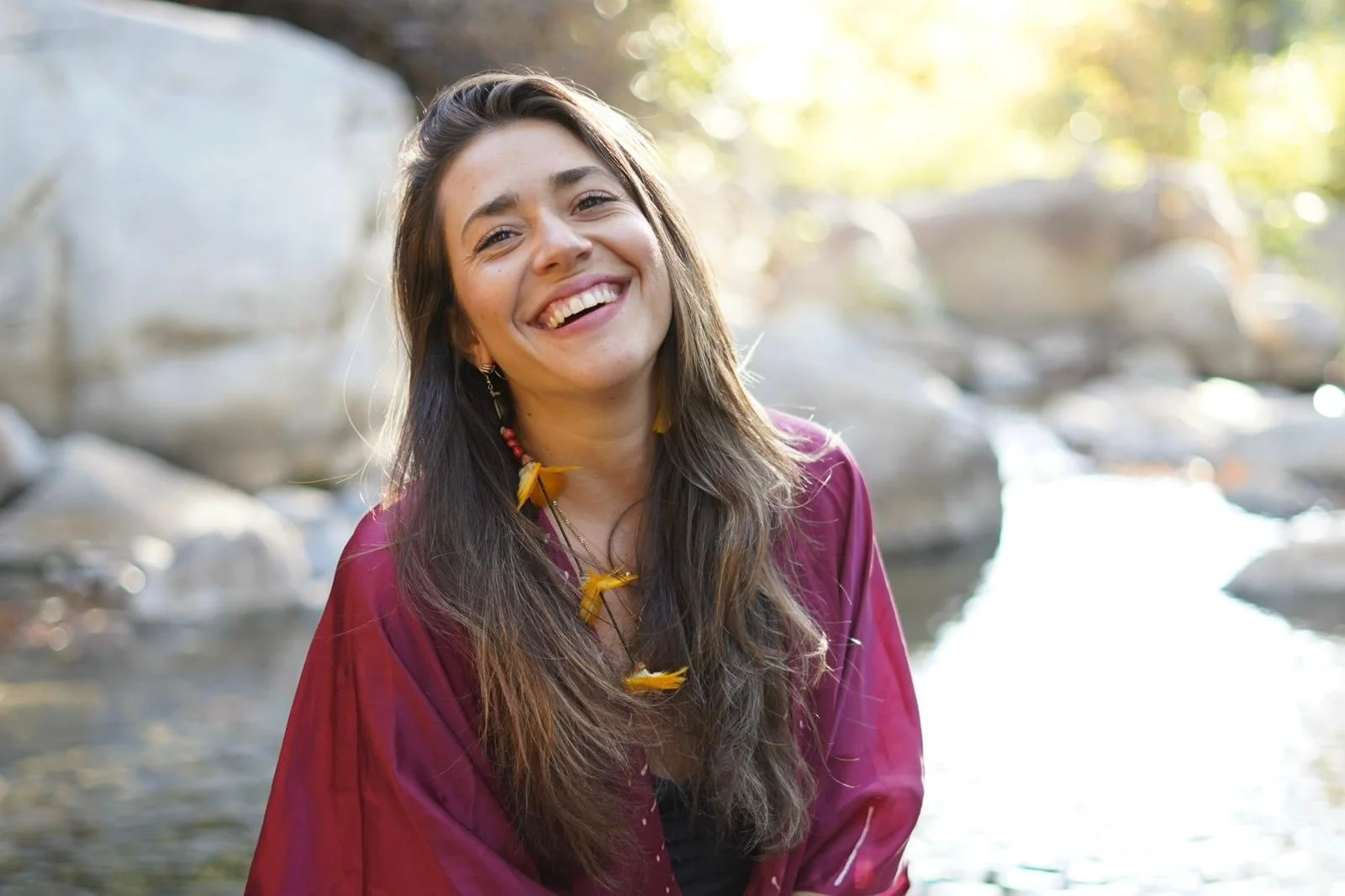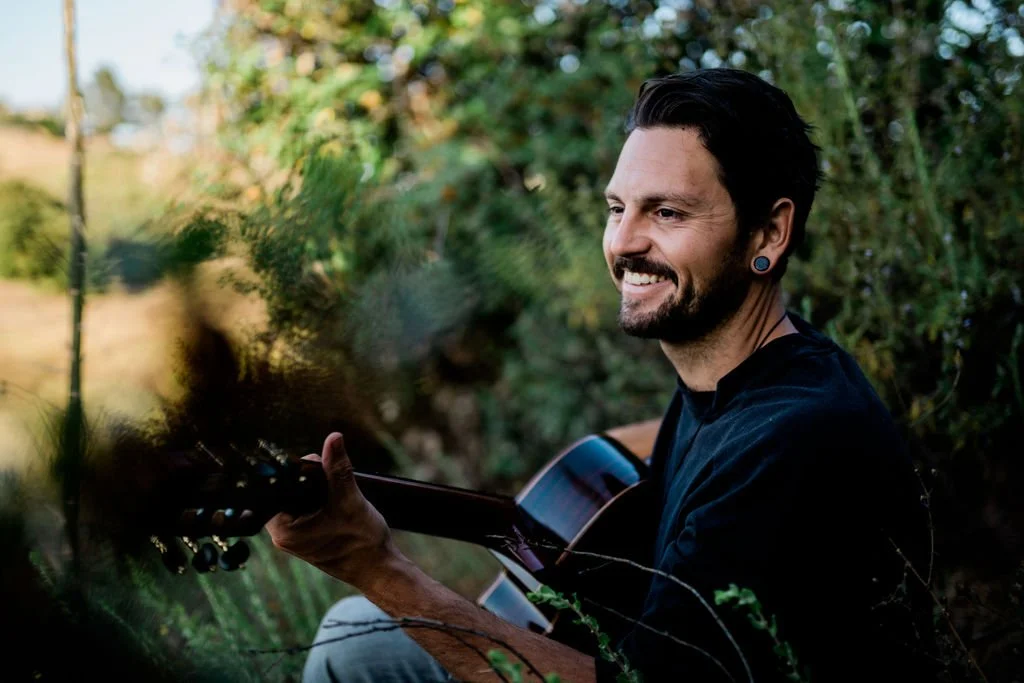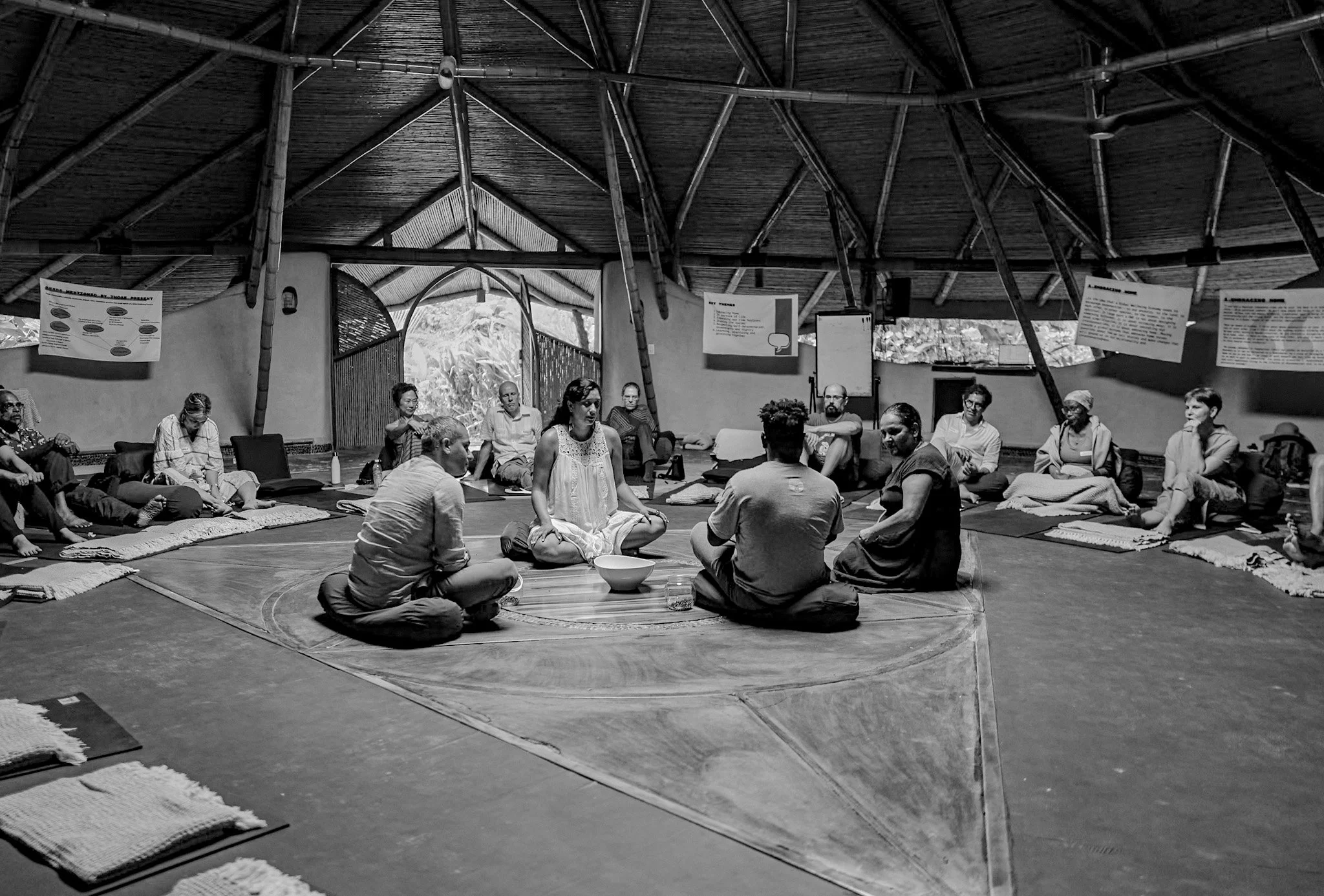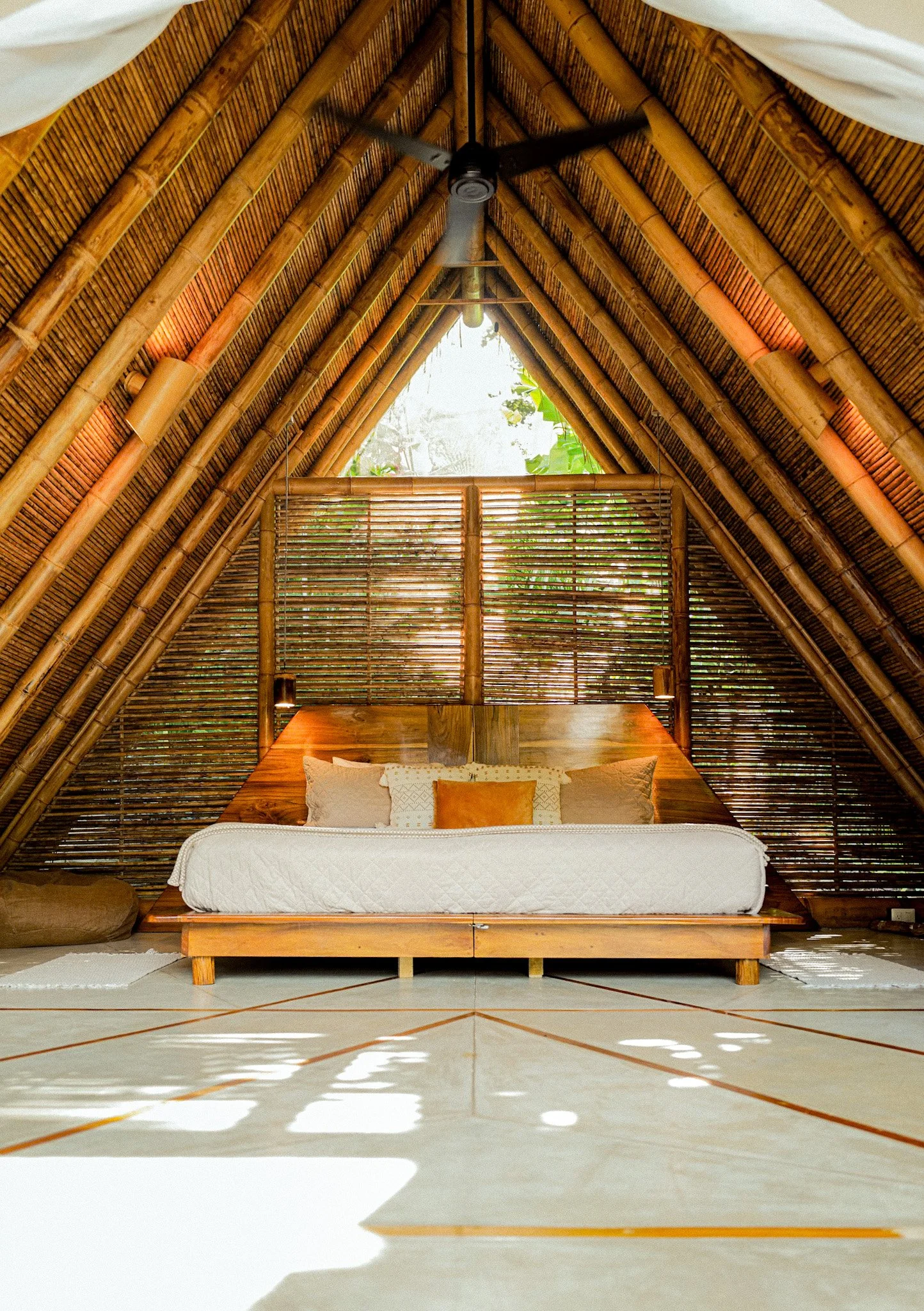About the Noke Koî
The Noke Koî are Indigenous people of Acre, Brazil, whose name translates to "original" or "true people." They are a First Nation of the Amazon, living on ancestral lands along the banks of the Gregório river, where their relationship with the forest runs deeper than memory.
What sets the Noke Koî apart is something increasingly rare in our world: cultural completeness. While colonization has fragmented many Indigenous communities, the Noke Koî have maintained their native language, Nokevana, across their entire population. Their ceremonies, songs, healing practices, and cosmological understanding remain largely intact—a living testament to their determination to preserve what is theirs.
The forest is not merely their home; it is their teacher, their pharmacy, their cathedral. Every tree, river, and stone holds spirit and meaning within their worldview. This profound relationship with the natural world manifests most clearly in their stewardship of Uni (Ayahuasca) and their unparalleled knowledge of Kambo—the frog medicine they have used with extraordinary skill from infancy through old age for countless generations.
Other Indigenous tribes throughout Acre hold the Noke Koî in deep respect, recognizing them as keepers of ancient knowledge and powerful healing traditions. Their medicine work represents not just personal healing, but a preservation of ways of knowing that predate written history—knowledge systems that may hold keys to understanding our relationship with the living world that modern civilization has largely forgotten.
MEET YOUR GUIDES
Cacique Paka Chay Kamãnawa
Born on the banks of the Gregorio River, Paka Kamãnawa inherited more than a name—he inherited a responsibility. "Spear" in Nokevana, his name was chosen by his mother as both blessing and burden, shaping him into what his people needed: a spiritual warrior for a culture under constant pressure to disappear.
At seven years old, while most children learn through play, Paka entered the ceremonial world of Uni. Under the tutelage of Romeya Koshti, one of the most respected elders, he has completed four traditional dietas—intensive periods of isolation, fasting, and communion with plant teachers that forge healers and wisdom keepers.
Paka belongs to the Kamãnawa clan, the People of the Jaguar, and now leads Timbaúba Village following in his father's footsteps. But his leadership extends beyond village governance. As a txana, he has received over 63 songs directly through the medicine—ancient prayers that emerge through him in moments of deepest ceremony. What makes Paka remarkable is not just his ability to channel these ancestral songs, but his innovation in adapting them to guitar, making traditional Txirîti accessible to both his own community and the outside world without losing their sacred essence.
He is both keeper of the old ways and bridge to the new, ensuring that the songs of his ancestors continue to be heard while teaching them to the next generation. He lives this dual role daily in Timbaúba village with his wife Rora and their three children, embodying the delicate balance of preserving a culture while allowing it to evolve.
https://open.spotify.com/track/42L0QAeJemH0dW8Z7tsy9i?si=R5zrhtDOSDWOeUnPurwKfA
https://open.spotify.com/track/3rSiBv5g2MF3bg6tERt4c4?si=gxcA0Kb3RZCprtAZDAzoJg
Rora Varinawa
At 26, Rora embodies a quiet revolution. She is the first woman in Noke Koî history to break into the traditionally male domain of ceremonial music, not through confrontation but through such undeniable skill and calling that tradition itself made space for her.
Born into the Varinawa clan—the People of the Sun—Rora has walked paths that were not meant for women in her community. Under the guidance of Romeya Pajé Kochti, the most senior spiritual leader, she completed a sacred plant dieta that typically prepare only men for ceremonial roles. Her dedication earned her recognition as a medicine server, a position that requires years of discipline and spiritual study.
What makes Rora's story remarkable is not just that she broke barriers, but that she did so while becoming a mother of three and partner to Chief Paka. She has managed to honor her roles as wife and mother while carving out space for her own spiritual leadership—showing other women in her community that tradition can expand without breaking.
Her art flows through multiple expressions: painting, jewelry, guitar, and song. For two years, she has traveled throughout Europe and Costa Rica, carrying the visual language of her people through the traditional Kene patterns that have adorned Noke Koî bodies for generations. These are not decorations but sacred geometries, each pattern holding meaning and power.
https://open.spotify.com/track/7xkVwAdidCEsOzt1BkpfEy?si=kw733aXyTC-GKhR8dsy4nA
Veronica Hernandez
Born in Venezuela, Veronica has lived the reality of existing between worlds long before she made it her profession. Her path through the Americas, Europe and more wasn't tourism—it was education in the most essential skill for working with indigenous medicine: understanding what gets lost in translation, and what must never be lost.
As a facilitator, Veronica's strength lies not in what she knows, but in how she creates space for others to know. Her training spans yoga, psychological therapy, and somatic healing, but her real expertise is in building containers—those invisible boundaries that allow people to feel safe enough to fall apart and put themselves back together differently.
Since 2023, she has worked alongside the Noke Koî, learning not just their practices but the deeper art of cultural translation. She understands that indigenous wisdom isn't something to be extracted and repackaged, but something to be encountered on its own terms. Her role is to help others navigate that encounter with respect and understanding.
Veronica doesn't facilitate healing—she facilitates the conditions in which healing becomes possible.
Wesley Parker
Wesley is a musician, artist, ceremonialist and earth steward. He synergizes 13 years of personal study and healing with the plants from various amazonian traditions from Peru to Brazil.
His main studies were passed to him by a Mestizo/Cocama palero and curandero. Deep in the Peruvian jungle he maintained a steady spiritual study of dietas with the master plants and trees of these ancient traditions.
In addition to his medicine study, he has worked as an ally and bridge for many of the families of the Yawanawa to first arrive in the US. Building lasting relationships with Cacique Isku Kua and the families of Mutum.
Wesley carries these healing traditions with the utmost integrity, with so much reverence and respect to those who have opened this path with the transmission of ancestral ways
He is humbled and honored to be of service to our beloved Pachamama and the healing that she so graciously shares with us through the plants.
https://open.spotify.com/artist/6ctClV0UiNxHj70ACEKN7y?si=JLxXUGQ3SNyLuHelAlApIw
Supporting the Noke Koî Community
This retreat serves a purpose beyond individual healing—it directly supports the preservation of Noke Koî culture for future generations. All proceeds from the retreat will fund the construction of a maloca (or cupishawa in Nokevana) in the Timbaúba village.
Currently, the community holds their ceremonies and meetings outdoors under the open sky. While there is beauty in gathering beneath the stars, when the rains come, members of the community get drenched during sacred ceremonies. During the day, the scorching sun makes extended gatherings challenging and uncomfortable.
A maloca is far more than shelter from the elements—it is the ceremonial heart of the community, a sacred space where prayers are offered, ceremonies are held, and crucial cultural transmissions occur. Within its walls, elders can pass oral traditions to the young without interruption from weather, ceremonial songs can be learned and practiced in comfort, and the living knowledge that defines the Noke Koî can continue its journey through time in a space designed for this sacred purpose.
For a culture that has maintained its integrity through centuries of external pressure, the maloca represents something essential: a protected space where tradition can flourish without compromise. By participating in this retreat, you become part of ensuring that the wisdom you encounter continues to exist for generations not yet born, sheltered and honored in the space it deserves.
About Entre Mundos
Entre Mundos exists because some bridges can only be built by those who have lived on both sides.
Founded in 2025 by Veronica Hernandez and Wesley Parker, we work at the intersection where indigenous wisdom meets contemporary seeking—a place that requires deep cultural sensitivity and even deeper respect. We are not teachers of these traditions; we are students who have learned enough to know how to create proper conditions for others to learn.
Our work centers on a simple but challenging principle: indigenous knowledge belongs to indigenous peoples. Our role is to facilitate authentic encounters with traditional healing practices while ensuring that the communities and cultures we work with are honored, supported, and fairly compensated for sharing what is most sacred to them.
Entre Mundos creates containers where profound healing can occur, where traditional knowledge can be encountered on its own terms, and where the wisdom of the forest can speak to hearts that are ready to listen. We hold space for transformation while ensuring that the source of that transformation—the indigenous communities who have preserved these practices—are treated as the teachers and wisdom keepers they are.
OFFERINGS
3 UNI MASTER PLANT MEDITATIONS
FROG MEDICINE
RAPEH & SANANGA CIRCLE
SACRED TXIRÎTI MUSIC WORKSHOP
SONG & DANCE CIRCLES
FACE PAINTING - KENE
TRADITIONAL CRAFTS MARKET
PREPARATION CALL
HOT SPRINGS
INTEGRATION CIRCLE
TIERRA VALIENTE | BRAVE EARTH
Brave Earth is located between San Ramon and La Fortuna, nestled in between Arenal Volcano and the Children’s Eternal Rainforest, the largest reserve of protected wildlife in Costa Rica.
As a living lab, we have experimented with different building modalities using AirCrete and materials sourced on the land including bamboo and adobe. We have implemented biophilic design, closed-loop systems and permaculture design principles. Ornamental, food, and medicinal gardens surround the center as well as hiking trials to a nearby river, and a natural swimming pond.
CULTURES OF TRANSITION
The impulse for Tierra Valiente stems from an awareness of our civilizational trajectory within the dominant culture with its source code of extraction, domination, commodification, colonization, control, entitlement, and separation from the living world.
We are both informed by this critical lens and inspired to create outside of the old values and incentive landscapes to build a culture based on reciprocity, regeneration and resiliency.
In this collective transition - whether you call it the Anthropocene, the Kali Yuga, late-stage capitalism or capitalist modernity - our intention is to become more attuned to this cultural context in order to decolonize the conditioning of the dominant system and be in deeper service to our collective potential.
Cancelation Policy:
If you cancel before 90 days of your reservation, your deposit will become a credit that you can use at a later date or transfer as a gift. Within 90 days of your reservation, your deposit will be non-refundable.

